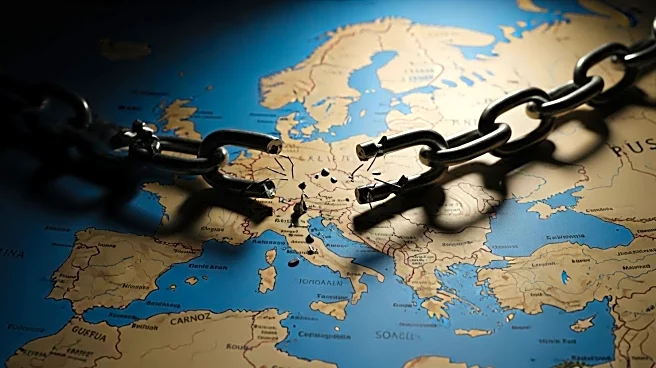What is the story about?
What's Happening?
German Chancellor Friedrich Merz has declared that Europe is 'no longer at peace' with Russia, highlighting the deteriorating relations following Russia's invasion of Ukraine in February 2022. This statement was made during a press conference in Dusseldorf, where Merz emphasized the shift from a previously peaceful era to a more tense and uncertain period. The situation has prompted European nations, particularly those in NATO, to increase defense spending and military readiness. NATO has committed to raising defense spending to 5% of GDP over the next decade, a significant increase from the previous 2% target. This move is part of a broader effort to bolster military capabilities in response to perceived threats from Russia.
Why It's Important?
The German Chancellor's statement underscores the heightened security concerns in Europe, particularly among NATO members. The increased defense spending and military preparedness reflect a strategic shift in response to Russia's aggressive actions and the potential for further conflict. This development has significant implications for European security and stability, as well as for the broader geopolitical landscape. The focus on military readiness and defense spending could lead to increased economic burdens on European nations, while also impacting diplomatic relations with Russia. The situation also highlights the importance of NATO's role in ensuring collective security and deterring potential threats.
What's Next?
As tensions continue to rise, European nations are likely to further enhance their military capabilities and strengthen alliances within NATO. The focus will be on maintaining a robust defense posture to deter potential aggression from Russia. Additionally, diplomatic efforts may be intensified to address the underlying causes of the conflict and seek peaceful resolutions. The situation will require careful management to prevent escalation and ensure regional stability. European leaders will also need to navigate the economic and political challenges associated with increased defense spending and military readiness.
Beyond the Headlines
The current situation reflects a broader shift in European security dynamics, with a renewed emphasis on military preparedness and defense cooperation. This shift may lead to long-term changes in defense policies and strategies, as well as increased collaboration among European nations. The focus on countering hybrid threats, such as cyberattacks and disinformation campaigns, will also be a key aspect of future security efforts. The evolving security landscape may prompt discussions on the role of international organizations and alliances in addressing emerging threats and maintaining global stability.
















